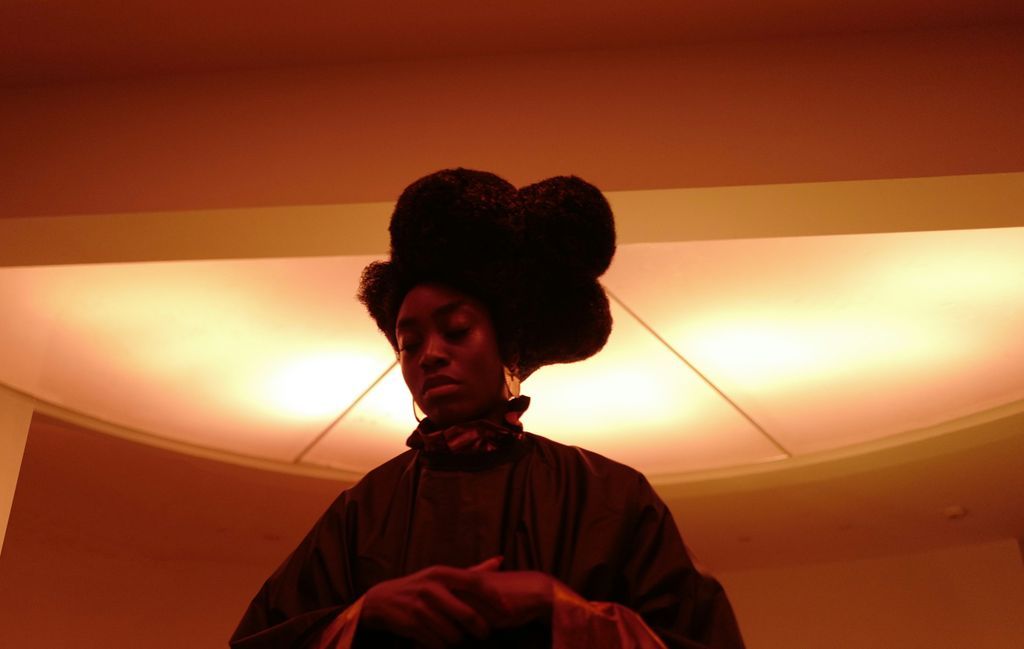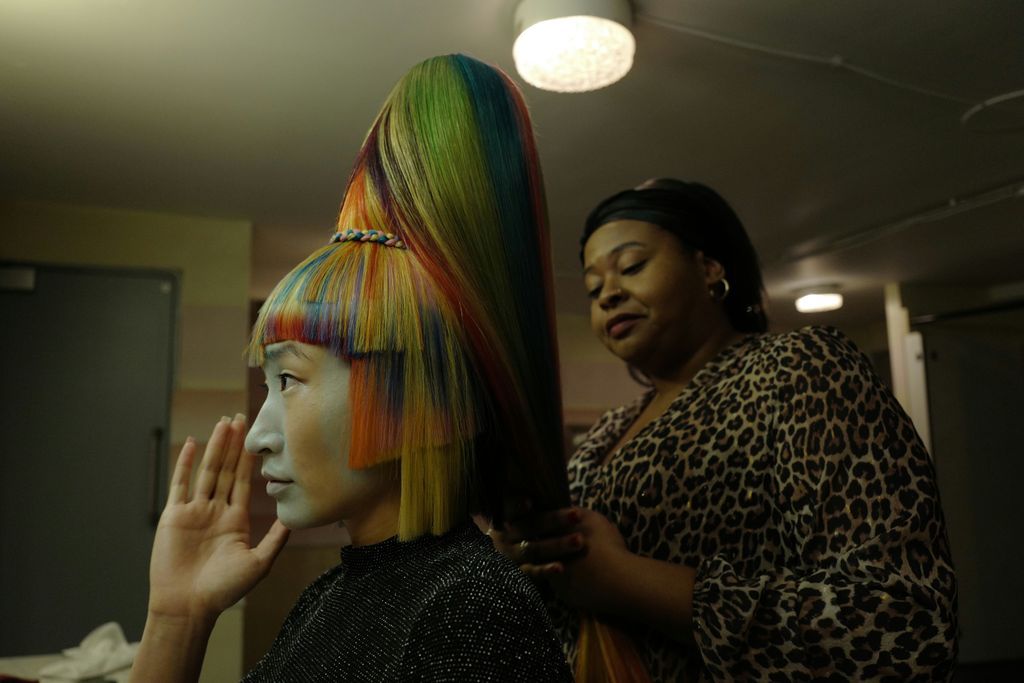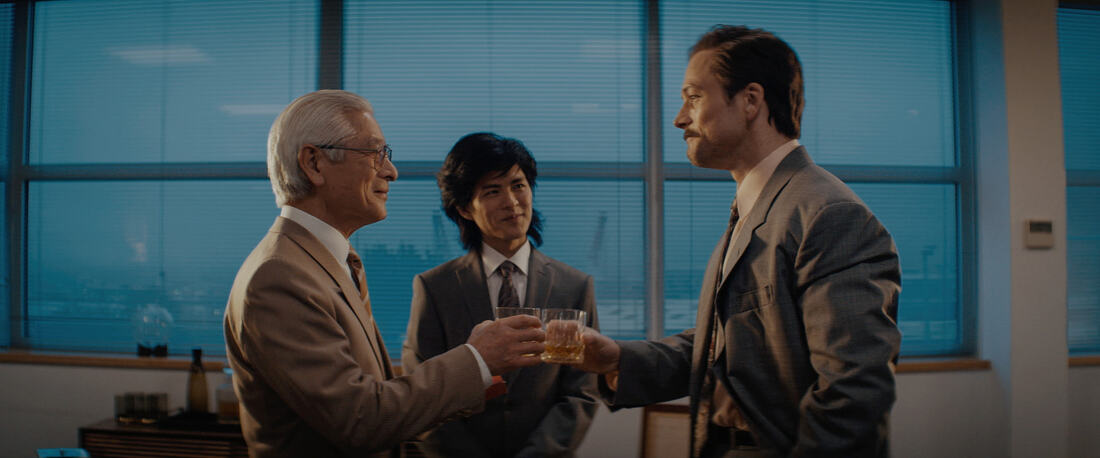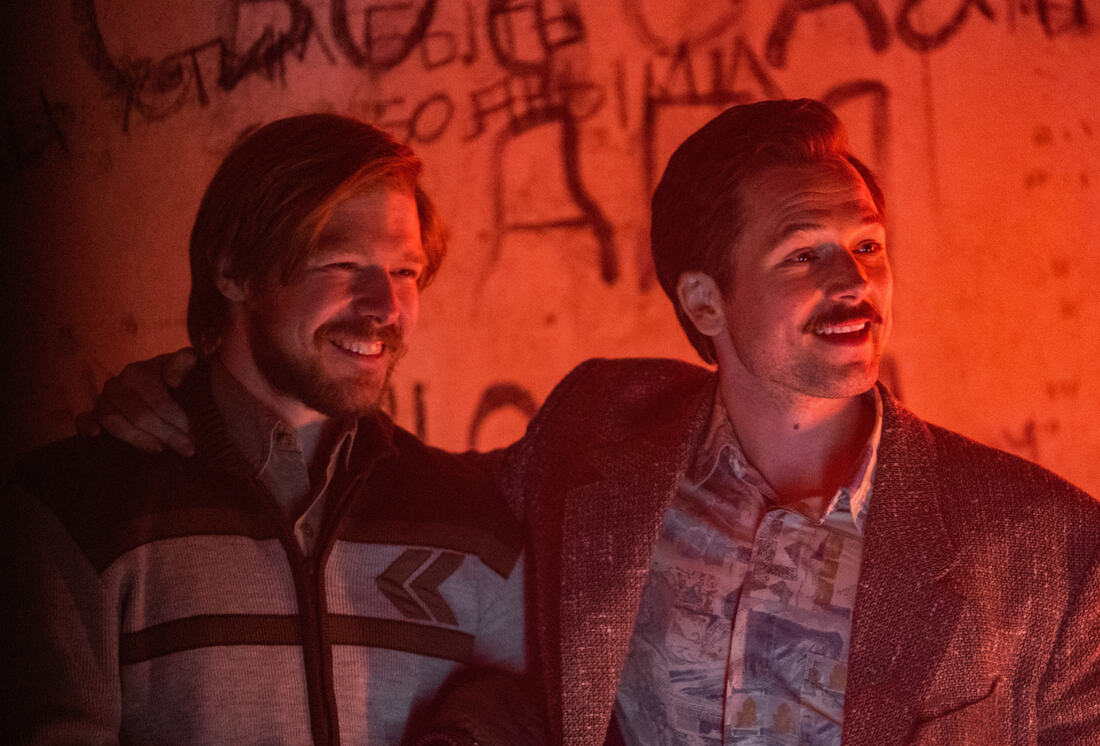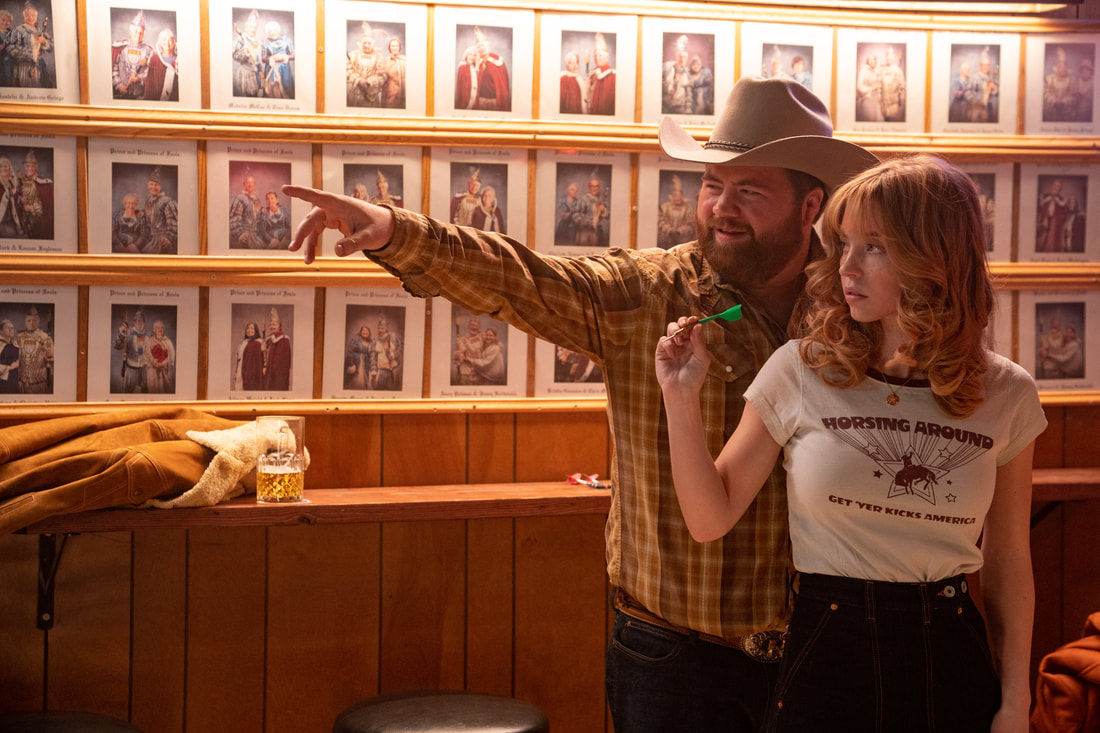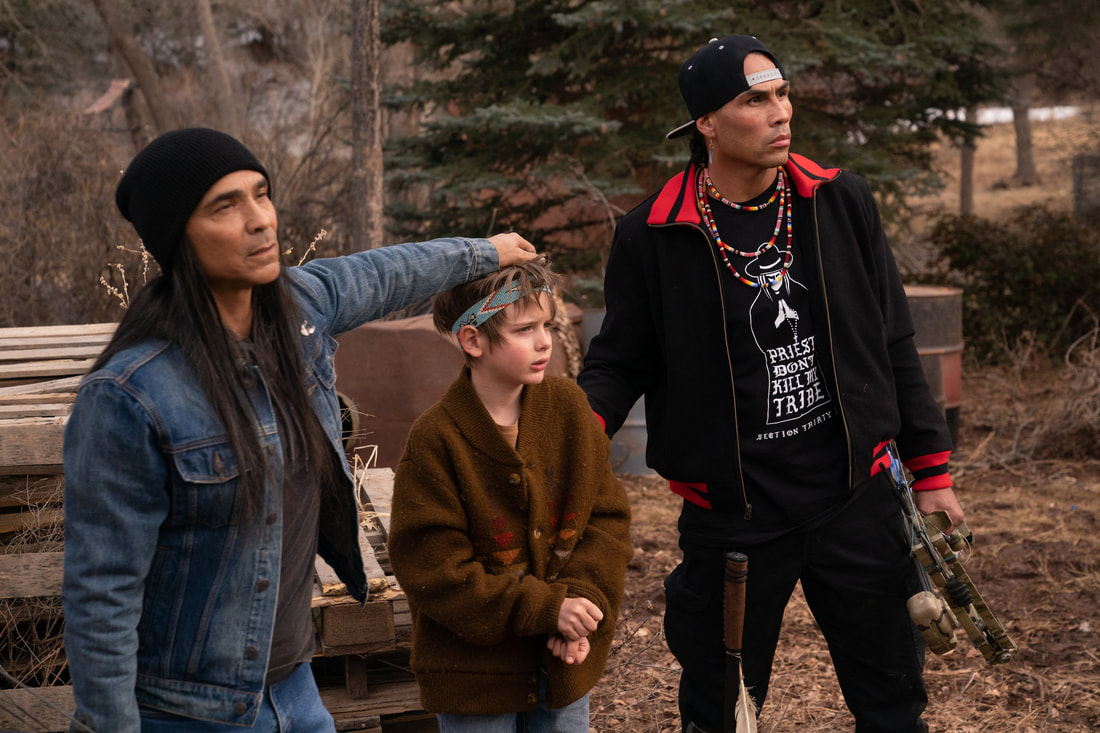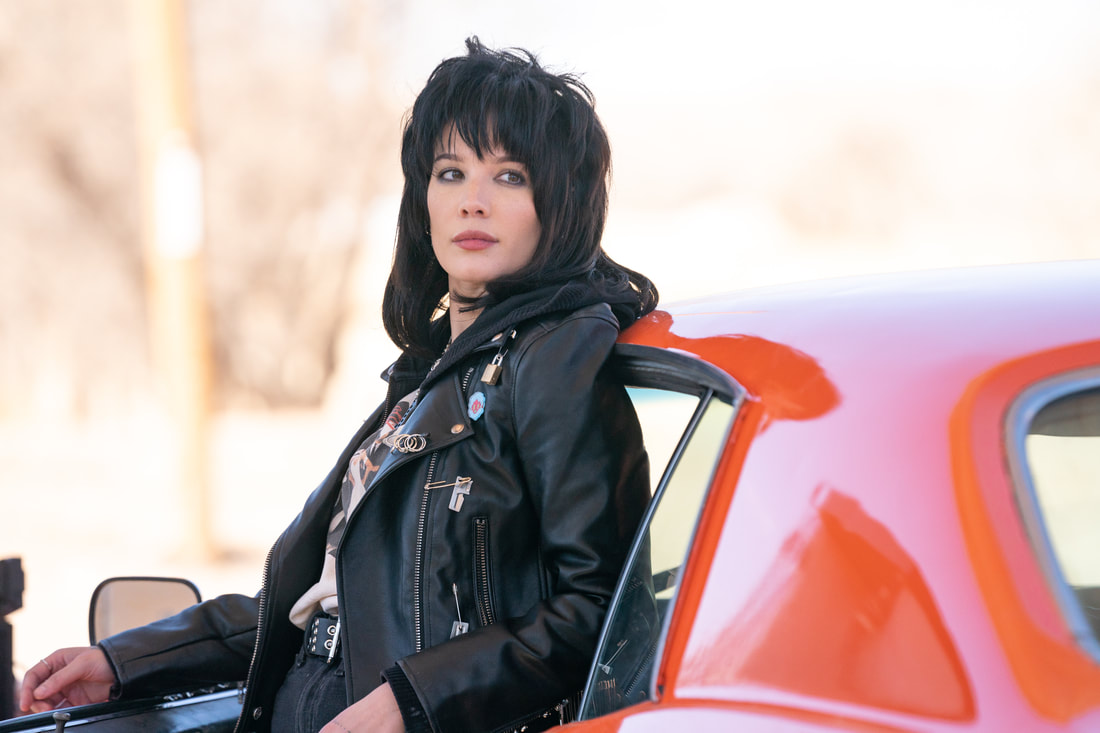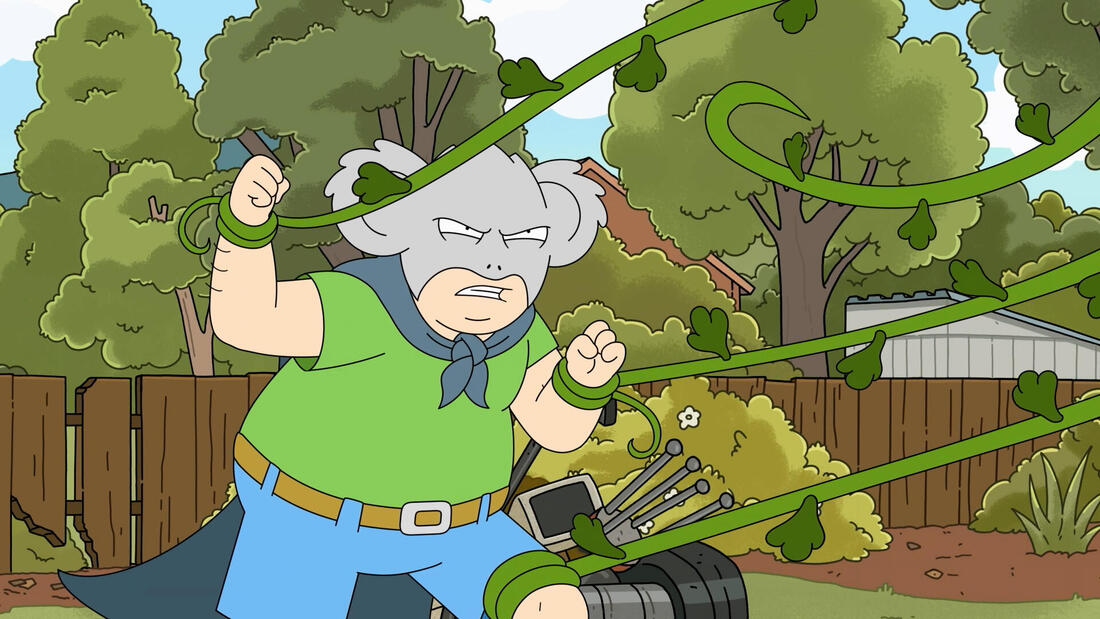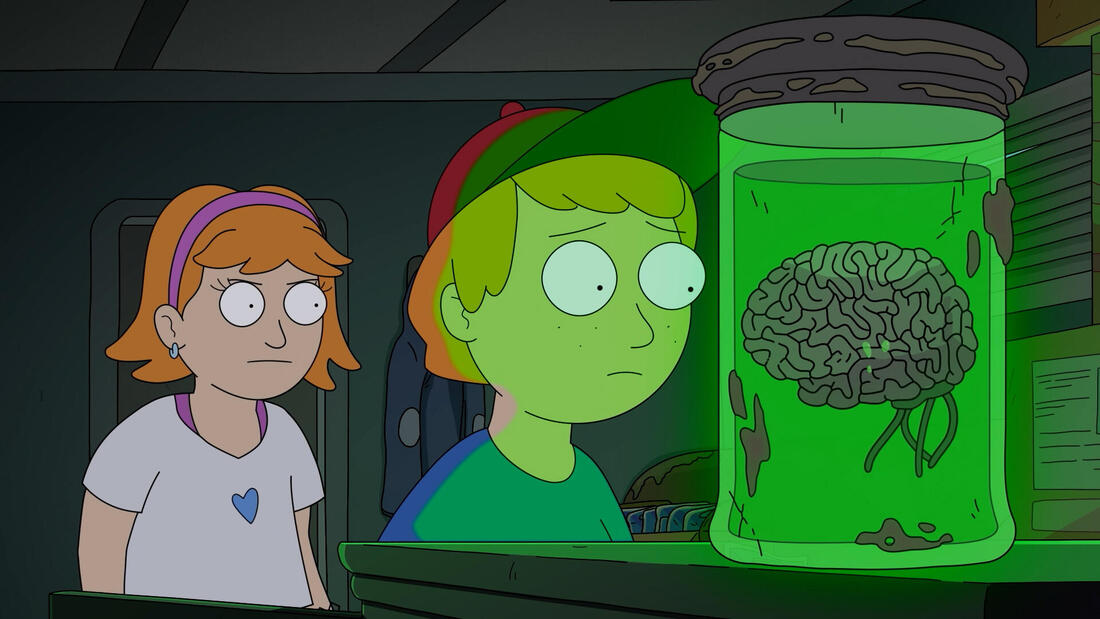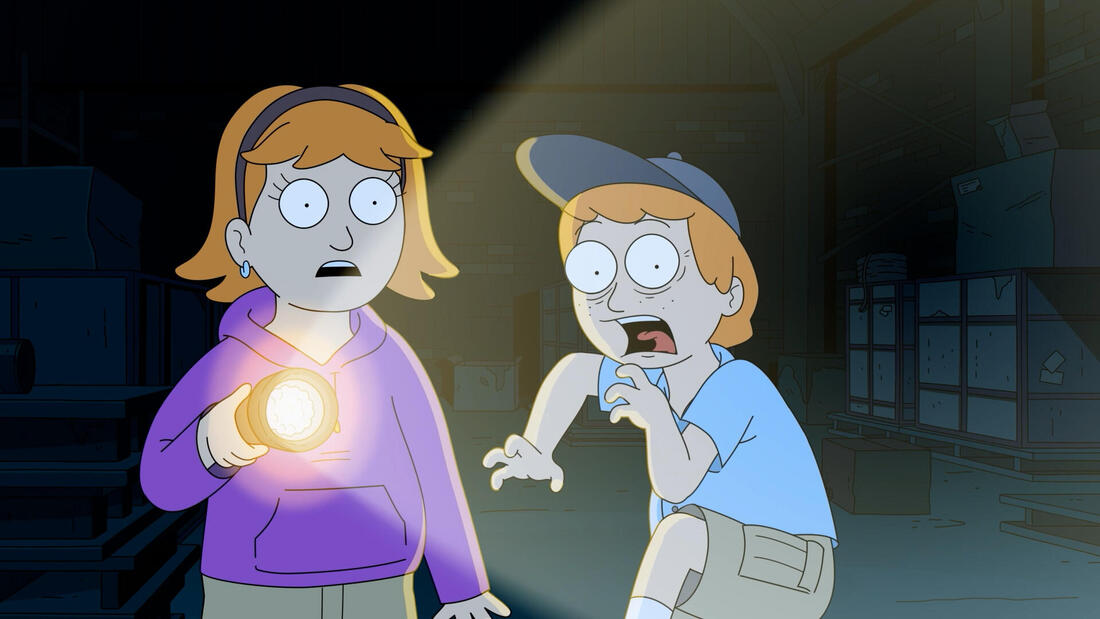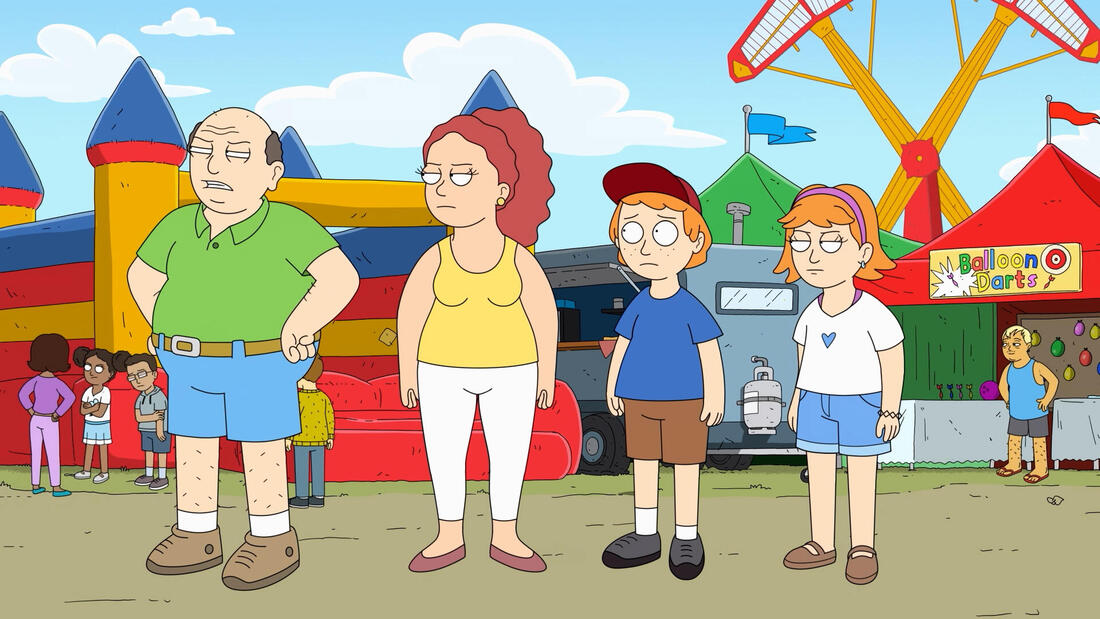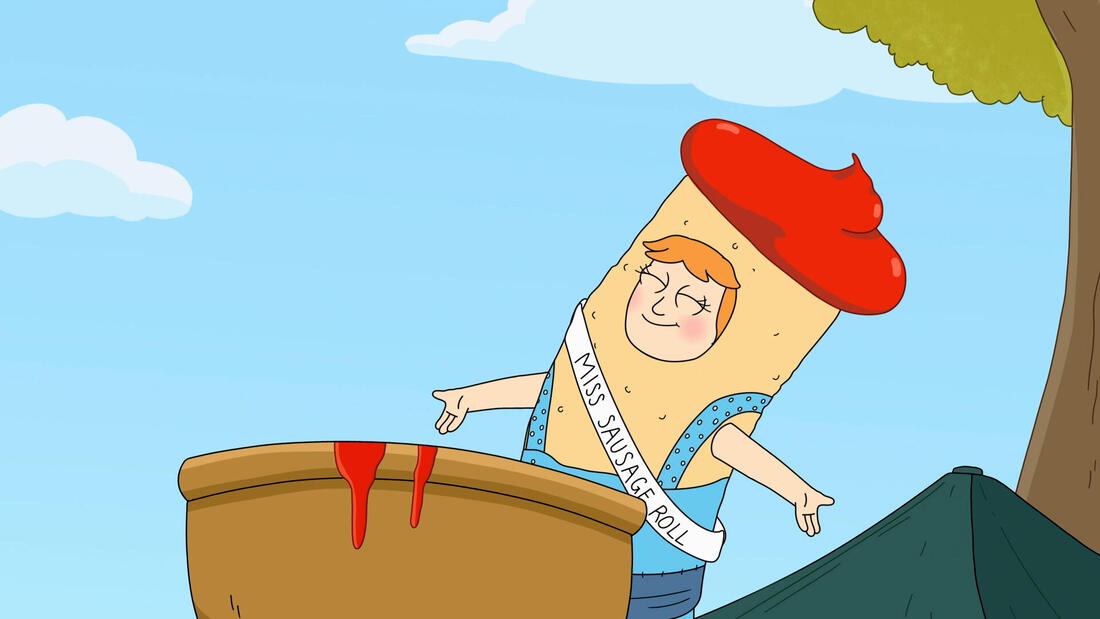|
Interview by Sean Boelman
Thomas Hardiman’s one-take hairdressing murder mystery Medusa Deluxe made a big splash at last year’s Locarno Film Festival, where A24 quickly picked it up for American distribution. A dazzling technical feat, it is one of the most ambitious directorial debuts of the year.
We at disappointment media got the opportunity to talk with Hardiman about the inspiration behind the film, as well as some of the film’s unique messages and themes. Check out the full interview below! On Medusa Deluxe's Technique and Style
disappointment media: What was the inspiration for Medusa Deluxe and telling this story as a seemingly unbroken shot?
Thomas Hardiman: The inspiration behind the film is that I want to put hairdressing on a pedestal. I want people to go, “Wow, hairdressing is flippin’ amazing!” At the same time, I make absurdist comedy. I want things to be kind of dramatic and kind of comedic and fun at the same time. So it's that knife edge and hairdressing gives you it. It's how people present themselves to the world. It has a kind of cultural value. You've also got the backbiting, the salon gossip. And you can pinball between the two — that’s comedy. In terms of the one shot, the specific inspiration is taken from my niece, actually, who was watching long hairdressing and makeup tutorials on YouTube. I just felt like they were taking media in a completely different way to what we had all grown up with. Like, you and I are talking on Zoom right now. We're getting used to this. This is how we inhabit the world with cameras now. And for a filmmaker, it just gives you incredible opportunities. Like with a murder mystery, you would cut for a red herring or a clue. But you're not gonna cut — it's gonna become a character drama, and it changes storytelling. And you get so excited by those possibilities. You want to go, “How can I make something emotional, heartfelt, comedic with this radically new technology and this radically new media landscape?” disappointment: Ever since Birdman re-popularized the long take format, opponents have criticized it for being “gimmicky.” How do you think Medusa Deluxe avoids the gimmick? Hardiman: To be honest, gimmicky is a funny, particular word. When people say phrases like, “style over substance,” I think they're sometimes easy catch-alls, and I don't think they're necessarily engaged with the topic on the level it deserves. If you look at, let's say, a one-take, filmmaking is connected to technology and things changing. Sound at one point was a fad. Color at one point was a fad. Every single technology is always a fad at some particular point. And I don't think it’s necessarily true. Those ones, obviously, are not, but I think having this potential to use cameras in slightly different ways is just reflecting modern life. The way we'll shoot on our iPhone is just standard to anyone. Anyone might do a 10 minute shot on their iPhone, that's just the normal world. And as filmmakers, all we're doing is responding to contemporary life. So for me, if you're coming from a point of view of being genuinely interested in the modern media landscape and character, and putting people in a space and world, you're never going to have a problem with being gimmicky because you're coming from a classic cinema point of view. A second ago, I was talking about 12 Angry Men. Sidney Lumet famously changed the camera's view during the film. It starts high, goes middle, and then goes low to increase the claustrophobia. We're all doing the same things. This is an AR rig Steadicam. There are times in which you want to increase the claustrophobia, so you go low. There are times when you want to orbit someone to work with the geography of the space. Those things are, in one sense, incredibly new and modern, and we can do them because of modern technology, and in another sense, it's traditional filmmaking. I feel like if you're doing that, alongside thinking about characters and their emotional sensibility at that moment, you're always on. disappointment: I think one of my favorite things about Medusa Deluxe compared to other one-take films is how seamlessly you weave between characters — both in terms of the camera and narratively. How did you plan this effect? Hardiman: Nashville, Altman, Slacker — those things are really important to me. I love ensemble dramas. You know, cinema, generally, is going to tell the story of two or three people, but occasionally, you get these filmmakers who are like, “I want to tell the story of an entire city. I want to tell the story of an entire community.” And I just find that incredibly exciting. That kind of broader canvas, that level of ambition where you're really shooting for the stars. In terms of meeting characters and being in the space with characters, I've thought for a long time. In a film, traditionally you'll have backstory, or you'll have someone who announces themselves, whereas my experience of meeting people is that you don't tell someone your entire backstory when you meet them. You create a portrait of someone through the little things that they say and the time that you're spending with them. That's how I approach filmmaking, and that's how I approach inhabiting spaces with characters. I feel like it comes from a place of reality, actually. So hopefully, the seamlessness of going between people is reflective of actual, genuine life experience because this film is on this knife edge between reality and incredibly heightened absurdism. And that's also something I love. I feel like realism is an interesting thing because a lot of people associate realism with something that's quite dour. And yet you happen to be with people sometimes when they are in the saddest moment of their lives, and it's so strange how comedy is used in those situations to lighten the moment. And I feel like comedy is almost the most realistic art form. We'll probably laugh a few times during this interview. It's just a way of humans interacting with each other that's sometimes not associated with realism in the way that I think it should be. On the Themes of Medusa Deluxe
disappointment: I think one of my favorite moments in the film is when Clare Perkins’s character talked about how hairstyling was this service profession, but it has allowed her to do something meaningful and beautiful. Why do you think the message of lower-to-middle class workers taking what are effectively crafts and turning them into art is so resonant?
Hardiman: I genuinely want to put hairdressing specifically on a pedestal. But I guess there's something that's reflecting on my family in this film. My mum's an Irish immigrant, so it is kind of like the characters in this film are my family. She grew up in East London, which was going through a pivotal time during her lifetime. There was a lot of immigration, so my family is incredibly diverse. So it's trying to find a way to tell stories that can be inclusive and reflective of modern Britain. At the same time, it's giving the respect that I feel a lot of crafts deserve. I hate this kind of, “This can be in a gallery, or this can be in a cinema, or this can be in a book,” culture. I just think it's rubbish. I think that all these people are singing from the same hymn sheet and deserve the same level of respect we give any other art form. Specifically with hairdressing, Eugene Solomon, who did the hair on this film, he's a very famous hairdresser, and I think the best hairdresser in the world. And I begged him to do this film. But when you look at the way he's crafting hair, he's working with the exact same kind of creative framework that a contemporary sculptor works with. He's doing the same thing. And that's what I want to shout from the rooftops. I want to say that all this craft and passion that people have for their industry, I have a real respect for it. Like when someone gets into weaving and then you have a conversation with them about weaving, there's an entire history there. There's an entire world, and suddenly, not only do you learn about their incredible weaving, you learn about them as a person. You understand why they did this, and I love those things as a conduit to character and personality. disappointment: Obviously salon gossip plays a big role in Medusa Deluxe, but I think gossip and murders go hand in hand as well. Like when there’s a death, people often start to spread rumors. How did your film explore this macabre connection between death and gossip? Hardiman: That's a great question actually. It's funny, right? Because yeah, I love gossip, I'm not gonna lie. I don't work in an office anymore, so if I ever go into an office, as soon as I can find out who fancies who, who's going out with who, I'm all over it. But then there's something else in it that is like gossip. These things, which can be really frivolous and silly in one sense, when they go from micro to macro on a kind of societal level, can become very dangerous and they can become mean. Like bullying is completely linked to gossip a lot of the time. And it's very interesting how everything you engage with, even if it feels silly, and something you might dismiss, has this kind of interesting duality. I guess that’s something I write about quite a lot. And what my characters are interested in is how things are always two things at once. How things can on one side be fun, and on another side, be spiteful. I guess it's that butterfly effect, isn't it? Something that feels very small and dismissible here suddenly grows into something that's incredibly big and either good or dangerous.
Medusa Deluxe hits theaters and VOD on August 11.
0 Comments
[SXSW 2023] TETRIS Executive Producer Maya Rogers and Producer Gillian Berrie Talk on the Red Carpet3/23/2023
Interview by Diego Andaluz
Launching at this year's edition of the SXSW Film Festival, Tetris hosted its world premiere and red carpet to much success, with reviews locking it in at 80% on Rotten Tomatoes and a promising streaming release on March 31st. Ahead of its theatrical release this Friday, disappointment media had the chance to attend the red carpet of the world premiere and talk with some of the supporting players in the release of Tetris itself.
As the current President and CEO of the Tetris corporation, executive producer Maya Rogers attended the carpet in support of the film, which tells the story of her father Henk Rogers’s quest to nab the publishing rights to Tetris. A young version of Maya Rogers is played in the film by Kanon Narumi, which Rogers calls “surreal.” When asked about her experience seeing her story told to the cinematic masses for the first time, ultimately, she says, “I forgot we were watching the Tetris movie because that story was so engaging. It was just touching to see that at the end of the day, it was a story about my family and about how Tetris touched so many people.” However, none of the success of the film could have happened without one of the producers herself, Gillian Berrie. Attending the carpet, she explained that during the pandemic, the crew “were looking at places in Eastern Europe, London, Berlin, Tokyo, but couldn't figure out what to do because a lot of those locations still looked like they were going to be closed down.” Then, all it took was one call from Matthew Vaughn to ask for help shooting in Scotland. Her initial response? "Yeah, why not?" However, that started a fruitful collaboration on the film that landed it many of its shooting locations, and shaped it into the film that premiered that night. Below, disappointment media readers can find the full interviews with Maya Rogers, CEO of the Tetris Corporation and executive producer of the film, and producer Gillian Berrie. Gillian Berrie Talks Filming Tetris in Scotland
disappointment media: So obviously, there's more to this story than just the creation of Tetris. What drew you to telling this in a larger than life way?
Gillian Berrie: While I wasn't part of the initial development phase, I've been working with [director] Jon S. Baird, who's Scottish as well. During the pandemic, they were looking at places in Eastern Europe, London, Berlin, Tokyo, but couldn't figure out what to do because a lot of those locations still looked like they were going to be closed down. Matthew Vaughn then said "Gillian, we could make this film in Scotland," and I said "Yeah, why not?" and that's how I came on board. So I quickly started doing my research to see what parts of Scotland could pass as Russia, and we actually shot the whole thing there. disappointment: Why do you think Scotland would make a great filming location in general? Berrie: The infrastructure is so fantastic. The crews are wonderful, and everything is so close. You never have to wait an hour in traffic — maybe five minutes of traffic. It's got everything. It's the best. Maya Rogers Talks the Cultural Impact of Tetris
disappointment: Maya, congratulations on the release of Tetris. What factors do you think made Tetris such a massive global cultural phenomenon?
Maya Rogers: I'm gonna say this: everybody wants to create. That's a basic human need and Tetris does that, so that's why Tetris is a perfect game. disappointment: Yeah, absolutely. And you know, I'm sure you're aware there's more to this story than just the creation of Tetris. Why do you think people should be excited to see this movie? Rogers: It's a story about love. It's a story about friendship. It's a story about family, and about all cultures coming together. At the end of the day, we're all the same. disappointment: So what was it like seeing the story that was yours told to the cinematic masses? Rogers: It was just surreal. In fact, I forgot we were watching the Tetris movie because that story was so engaging. It was just touching to see that at the end of the day, it was a story about my family and about how Tetris touched so many people.
Tetris screened at the 2023 SXSW Film Festival, which ran March 10-18 in Austin, TX.
Review by Sean Boelman
One of the most star-studded premieres of this year’s SXSW was Tony Tost’s Americana, an ensemble Western following a community of people whose paths intersect around a Lakota Ghost Shirt. Writer-director Tost is no stranger to the Western genre, having been a writer on the shows Longmire and Damnation, but Americana represents his feature debut as a director.
We at disappointment media had a conversation with Tost about his influences for the film, why he loves the Western genre, and working with such a talented ensemble. Check it out below. On Americana’s Influences
disappointment media: So it seems to me like the film is very influenced by modern classic crime movies like Pulp Fiction and the Coen Brothers films. Would you be able to discuss some of your influences?
Tony Tost: Talking about influence, I could put it into buckets. There's influences specifically on the chase, and those will maybe be the things that are a little bit less on the tip of your tongue — ‘70s crime movies like The Sugarland Express, Steven Spielberg’s first theatrical film. That's the movie I asked everybody on the crew to watch. If there's one movie to watch to get the vibe I'm going for with it, that's it. And that whole realm of really well done, unpretentious crime genre films that could potentially show at a drive in movie theater. So anything from like John Carpenter's Assault on Precinct 13, Michael Cimino’s Thunderbolt and Lightfoot, Don Siegel’s Charlie Barrett, things like that. That’s what I was aiming for. Then, to Nigel Bluck, our great cinematographer, the photographs of William Eggleston, who's my favorite photographer, and anything that Robert Mueller shot like Paris, Texas, or Ghost Dog. Then there's the other bucket of stuff that's so deep in my brain that I'm almost trying to escape its influence, but I never quite do. That would be Tarantino, the Coen Brothers, all the stuff that kind of made me fall in love with cinema in the first place as a teenager. Whether you like it or not, in the film, it’s like “Oh yeah this dude loves Tarantino and the Coen Brothers.” Just the tonality, or moving around structure, and moving from violence to humor while trying to still have some sincere emotions in there as well. That’s so deep in my DNA, into my love of storytelling, my love of film. First films often really wear their influences on their sleeve, and maybe as I go, I can find ways to like, submerge those influences even more. You know, it's pretty inextricable from what I love about the movies and what's a good time at the movies for me, it's those filmmakers. disappointment: And you mentioned the cinematography of the film, I thought that it gave it a very epic feel, which — given that your DP worked on the Lord of the Rings movies — isn’t surprising. How did you contrast the epic visuals with a story that was often more restrained and intimate? Tost: Well, thank you for that. In my head, and with Nigel, it was always like, “We’re shooting a Western.” I mean, it's a crime film, and it's got these other influences, but the heart and soul of it turns into a weird Western. And the iconography of the West, the open landscape, and the kind of residue — both like narratives of the West and just the actual history of the West — should be soaked in. So in terms of how we designed shots, that is just the emotional landscape. And then within that, we try to get that big arch, where you feel the weight of the Western itself and of the history, but then you get this miniaturist kind of emotional sketches of these overlooked outcasts. It's trying to find the balance between those. You want to feel the indifference of the landscape to these small lives and how they still have to live their lives and they still have to pursue whatever they're after, or find their identity in this New West. It's part of the design, and then you just try to figure it out, shot by shot, scene by scene on the budget and schedule that we have, which was generous for a first film, but we had 26 days. So you have to pick your battles and do what you can on that schedule. A big part of the directing job is prioritizing and figuring out, “Okay, we gotta move on to the next thing, because we've got five scenes we have to hit today.” On the Unique Perspective of Americana
disappointment: Having written also for Longmire and Damnation, and now having Americana, what is it about the American heartland that you think makes it such an interesting setting?
Tost: Part of it is that I grew up in a small town. I was born in the Missouri Ozarks, and then we moved, when I was very young, to rural Washington State. First, we lived in a camper trailer in my grandparents backyard, and then we lived in single wide and double wide trailers — sometimes in trailer parks, but sometimes out in the country like Kyle and Mandy and Dylan. That outer landscape in which that kind of came to be became my inner landscape in a way, and that's just where I feel comfortable. Like, if I close my eyes and start thinking about a story, I'm never setting it in New York, I'm never setting it in LA. I'm a tourist there. I feel at home in a rural setting, and especially among blue collar people of whatever demographic. I feel kinship with them. It may not be reciprocated, but I feel, even though I work in Hollywood, I consider myself like a blue collar dude. I graduated high school and started working at a pickle factory and worked fast food jobs and went to community college. And that's when I discovered I was a writer. I graduated high school, working at a pickle factory, and it's like, “Oh, this sucks. I don't want to do this for the rest of my life.” So I started taking classes at community college, and then I took a creative writing class and a literature class. I started thinking, “I really like art. And I think I'm a good writer.” And then I got into films. But nobody in my family had ever gone to college. My parents, they're working people. They’re the day and night janitors in my elementary school. We didn't have art at home. What we had at home were Westerns. We watched Clint Eastwood Westerns or Burt Reynolds movies, country music and pro wrestling. That’s what so much of the material of Americana is. And part of it is that because I have this blue collar chip on my shoulder, Hollywood looks down on that stuff or doesn't put it in here. Like oftentimes you’d only see rural people like, a white collar professional goes into a small town and, “Oh, they're all inbred people, and they're going to kill you.” Or, “Let's tell a story about how everybody's on opioids.” Obviously, there's problems in real life, but you can also just tell a story there without having to have some big social commentary. I love that about ‘70s cinema, blue collar people could be the leads of movies, they don't all have to be like architects or influencers or shit like that. So it’s a little personal for me. I cut my teeth on Westerns. Left to my own devices, I'd rather just watch a Western or a samurai flick at home. That's the kind of stuff I like. I like violence, morality plays, and open landscapes. I think people still like stories set here. You don't have to necessarily do some kind of commentary on it, you can just take people and put them in an interesting story, and that's something I'm focused on. I mean, who knows what I do after this, but doing crime or Western-inflected stories in “flyover settings,” I wouldn't mind doing that just for the foreseeable future. There's a lot of stories I can tell with those ingredients. disappointment: I found it very interesting that much of the film was seen through the eyes of a character that would be considered innocent, or, perhaps more accurately, oblivious — like the child character or Paul Walker Hauser’s character. Why did you find it interesting to take this approach? Tost: Sometimes they just emerge when you write, so it wasn't necessarily a strategic thing. You know, Sydney Sweeney's character is also a pretty innocent character in a way, even though she kind of conceives of this idea. She doesn't know what she's getting them into. Just for me, I get a little bit impatient or uninterested in stories where everybody's like dark and edgy. I wanted to do an ensemble film, and with that, if every character has the same attitude, it's gonna get monotonous. I love Robert Altman, and a movie like Nashville, part of the thing I love about Nashville — it’s one of my favorite movies — is that you have this whole range of characters that are borderline oblivious in a sense, and others that are completely kind of almost cold-blooded careerist types, and then there's a whole range in between. And that's, to me, that's just an interesting canvas. It’s nothing really beyond that — trying to come up with characters and combinations of characters that can just keep my interest because in writing this, I had a couple ideas, but I just kind of wrote it to discover I was just curious about these characters. I knew I wanted to have a showdown, and things like that, but like, I let the characters kind of surprise me as I was going, so I didn't necessarily know different elements about them until like, halfway into writing the script. On Assembling a Fantastic Ensemble
disappointment: I also want to talk about the massive ensemble, which is filled with lots of talented people. What was it like recruiting and working with them?
Tost: It was a blast. It's my first film, so it's not like I'm walking in Mr. 800-pound Gorilla, people lined up to work with me. Being a first-time director is spooky. And it’s kind of a weird script, so you don’t know how people are going to respond. But my producer Alex Sacks — who has been my partner on this from step one, to the whole thing — and I, we knew it was a little bit of an oddball story, first-time filmmaker, ensemble, a nonlinear story. We're not hitting a bunch of commercial bull's eyes there. The thing that's going to get us to get this film made, is if people get excited about the cast. So it's like, “Okay, who would be exciting to financiers, but who also maybe haven't played these roles before and would be interested in this.” So like, Sydney Sweeney hasn't played a character like this. Penny Jo isn't a very sexualized character. I mean, she's shown that she doesn't have to play sexualized before, but she is mostly known for Cassie in Euphoria, which she’s amazing on, and White Lotus, which she was amazing on, she's an incredible actress. But we thought she might be interested in this because this is an opportunity for her to show a different shade. And then Paul Walter Hauser, one of my favorite working actors, Lefty’s kind of the male lead, and almost like a romantic figure. He always jokes like, “Are you sure you sent it to me on purpose, and you weren't actually trying to send it to Miles Teller or someone like that? These more traditional-looking leading man types.” But I love Paul, and he’s amazing. And I thought it might be worth the jump if he liked the character because it’s maybe a role he doesn’t get a ton. The one role I wrote for a specific actor was Ghost Eye for Zahn McClarnon because we worked together on Longmire. And he liked my writing on that, we hit it off there, he knew that I'm a huge fan of his. But I also know that Zahn is just like the coolest dude, so chill and dryly funny. And he doesn't often have roles that lean into that, of him being like, the coolest guy around. So I wrote Ghost Eye specifically to try to be dryly funny, and he’s just cool, so that maybe Zahn would take time out of his super busy schedule to come do this, because he could play a little bit of a different shade. That took at least like a year to put the package together and try to get it so everybody's schedules would line up. And Halsey actually got on my radar because she's a big Lakers fan. I'm a big Lakers fan. And she has a really entertaining Twitter account just for her play by play commentary on Lakers games. And I'm just like, “Oh, she's so fun. She's really interesting. She really knows her basketball.” And I started kind of checking out her music more and her music videos, and I was like, “Oh, shit, I think she's actually how I picture Mandy?” And I had no idea whether or not she was interested in acting, but I suspected that she was. So we told Alex,”Why don't we just try sending it to see if we can somehow get it to Halsey and just see? Maybe it would be cool to have her come in.” And maybe if she's interested in acting, maybe she would take the leap. And she did. She really dug the role and was totally game on anything. I'm so glad that people are really responding to her performance, because I think she's great. So it's trying to find those interesting people, but also knowing as a first-time filmmaker and everything like that I have to offer them something too. I think they may be interested in doing something a little different.
Americana screened at the 2023 SXSW Film Festival, which ran March 10-18 in Austin, TX.
Interview by Sean Boelman
Working closely with series creator Michael Cusack, Koala Man showrunners Dan Hernandez and Benji Samit helped to craft an immersive alternate version of the Australian suburb Dapto. We at disappointment media got the opportunity to talk with Hernandez and Samit about the writing of the show, balancing its tone, and staying true to the real-life Dapto. Check out the full interview below!
On Creating a Show That Is Silly Yet Grounded
disappointment media: So Koala Man is full of episodes that have these silly, absurd premises, but you also kind of approach them with a straight face. How did you find this balance between the goofiness and absurdity with something a bit more grounded?
Benji Samit: Yeah, that was an important guiding principle for us in crafting this show and these episodes — that we never want it to go crazy just for the sake of being crazy. Yes, we go to zany, insane places on the show. But every time it's based out of a real grounded, character thing or story thing. There’s emotion at its core. We find that, as long as you can hold on to that through-line of emotion and story, then you can go as big as you want and you can still feel connected to what you’re watching. Dan Hernandez: And I think that also combines with, when we were developing the show, there was a question of, “Well, how crazy should it go?” There's a version of this show that could be King of the Hill that is really, very grounded and it's not supernatural. But as we developed Kevin as a character, we realized what was funny about him was the fact that he doesn't have powers or that he's not in shape, but he does have this ethos that demands that he interferes with things. It became funnier and funnier to us to put him up against real threats that he should have no business going up against, like an alien, like cannibals, like Manimals. Every time it was like, we're sending this out of shape guy with no powers against something that should kill him in a second. And that was funny to us. And so the comedic element was the more you believe Kevin as a character, in his mind, like cutting the grass one centimeter and fighting an emu that has a machine gun are basically equivalent, just a problem to be dealt with, in his mind. And that makes him endearing and sort of difficult but also hilarious in his misbehavior and shit like that. disappointment: I think one of those emotional through-lines that you talked about that was really powerful to me was the theme of family. How did this theme really resonate with you guys in the show? Hernandez: Benji and I both have young kids. I think that becoming a father over the process of working on this show was actually extremely useful to the writing of the show. Because you start to think about things in a slightly different way. You're not really just focused on yourself. All of a sudden, you start to think about, “What is the legacy that I'm leaving for my kids? What are the things that I dislike about myself that I don't want to pass on to my kids? How are my bad behaviors going to affect them in the future? How did my own parents' behaviors affect me?” And when you really started to delve into that, that was a very fertile territory for emotional stories. At the same time, we wanted the show to be optimistic. We made a decision early on that this was not a cynical show, that this was kind of positive in a way, life-affirming. Samit: We wanted the family to really love each other, you know. Kevin — Koala Man — he loves his town, and he loves his family. That’s his guiding principle. But then within the whole family, Kevin and Vicky love each other, even though they have their issues with each other, and the kids have their issues, everyone in the family has their issues, like we all do. But at the end of the day, they are 100% there for each other. Hernandez: Even Alison, on her quest, she’s almost embarrassed that she loves her dad in that episode, and that that felt real to me on some level about being a teenager and being trapped in that idea of popularity. But you’ve got this person who’s on your side no matter what: your dad. And that was very moving to me. So that’s how we approached the family element. And we realized, if we grounded the family element in real human emotion, real stakes, that let us be as crazy as we want it to be on all the other stuff, because the stakes for them were very real. disappointment: One of my favorite things about Koala Man is that everybody could walk away from the show with a different favorite character because the subplots are so developed and lived in. Do each of you have a character that you would call your favorite? Samit: It’s a tough one, because they're all our babies, you know. But in terms of just fun to write, Spider, he can just get the punchline. So that’s always a fun type of character to write. I think Vicky is the emotional heart of the show. So she’s obviously a favorite of ours. Hernandez: It's so hard to pick. I really enjoyed writing the kids, honestly, because I think it was fun to go back into that teenage place and try to project down through the years of what it felt like to be an awkward teen or to be wanting people to notice you. And so I think Demi Lardner is the secret weapon of the show. I think she gives an absolutely remarkable performance. Her voice is incredible. She's so funny. And she's someone that the world, that we in America we're not as familiar with. And I think that after this, I hope that people will be because she's awesome. So Allison was a real favorite of mine to write just because to be able to be a mean girl for a minute — that was a fun thing to do. On the World-Building of Koala Man
disappointment: Something else that really stood out to me about this show is that there are a lot of jokes and elements in the series that are very specific to Australian culture and neither of you is Australian. So I'm assuming that writing the show just as much as it will be for the viewers is this learning, immersive experience in the culture. What do you think is one of your favorite things that you got to discover about Australian culture through the show?
Samit: I mean, there's so many little quirks. It was really fun seeing the similarities to America, but also the differences. Finding out about the emu war, finding out about showbags, the tradies. Skilled laborers being at the top of the social food chain was such a foreign concept to all of the American writers, but to the Australian’s they’re just like, “Oh yeah, no. An electrician is just the coolest guy in Australia.” Hernandez: I thought what was very interesting was sort of the directness of Australian culture. Like tall poppy syndrome is the idea that anyone that gets too big for their britches, we don't like that, you kind of do your job, you kind of plug ahead, and you keep your head down, and you live a good and fulfilling life. And that’s what you do. And it was interesting to juxtapose that with a character like Liam, who actually does have a little bit more of an artistic impulse, who is interested in things like nerdy or geeky things, and his feeling of, “Do I even belong here? Should I be in Australia?” Which, ultimately, one of the reasons he runs away to Hollywood Island and in the finale is that he's in search of something more. And there are some people that really thrive within that culture, then there are some people that feel not understood. That really does come down to sort of cultural values and what is privileged there and how it's quite different from what's privileged here, even though it seems like it should be very similar. The nuance of it is totally, totally different. disappointment: So I want to compliment you guys on the world building of Koala Man. I really love that aspect of the show. You balance the mundane suburbia with these fantastic events. How do you kind of go about juxtaposing this world in that way? Hernandez: I think because Dapto is a real place and it really is Michael's hometown, that there's a feeling of reality underlying all of the show that yes, we're blowing it out into the most surrealistic, crazy, over-the-top version of it. But really, it's a real thing and a real place. And these are people and places identifiable to Michael in his own life and the streets that he grew up with. We've been fortunate enough now to talk to other people who grew up in Illawarra and Dapto. And they’re like, “Yeah, that’s what it’s like.” Even though there isn't literally a plant monster rampage in the city, the other stuff is just real. That's just what it is. And so we felt like that reality wedded to some of the classic world building that shows like Simpsons, South Park, Family Guy, where you have the town as a character, and you know the denizens of the town, and how they’re going to react. You know that Randy is gonna overreact on South Park, you know that Reverend Lovejoy is gonna be sanctimonious on The Simpsons. And once you start to get to know the geography and the interpersonal geography of the people and places of the town, it's fun to start to anticipate how they're going to react. What are they going to do? What is Spider going to feel about this? What is Louise going to feel about this? And that was really important to us because it made it feel very lived in. It made it feel like this is a place that functions, whether we as a viewer are watching it or not, and we really tried to cultivate that throughout the entire process of running the show.
Koala Man is now streaming on Hulu.
Interview by Sean Boelman
Hulu’s new adult animated show, Koala Man, created by Smiling Friends creator Michael Cusack has an A-list cast led by Australian and New Zealand legends like Hugh Jackman, Sarah Snook, Miranda Otto, Jemaine Clement, and Rachel House. But fans of the show will be equally — if not more impressed — by its breakout star: Australian comedian Demi Lardner.
We at disappointment media sat down with Lardner to talk about her character in the show, why she hopes Americans will be subjected to bags of random junk, and the theoretical assassination of one of her more famous co-stars. Be sure to check out the interview below! On Why She Loves Her Character
disappointment media: I think that the character of Alison really has one of the most interesting arcs of any character in the show. What spoke to you about this character's role and growth in the show?
Demi Lardner: I love Alison. And the thing that I love most about her is that she's a weird little psycho. And her growth is uncomfortable, which speaks to me because like, when I watch people kiss in movies and emotions and stuff I’m like [she shivers]. But obviously, it’s a good thing. And I think the amount of discomfort she has with her own goodness is very cool to me. And also, I don’t have to act much when I’m uncomfortable with it, because I just am. disappointment: I think something that's really special about Koala Man is that the subplots are just as interesting as the main storyline. Other than your own character, of course, do you have a particular character that you found was particularly compelling or your favorite? Lardner: So I'm extremely drawn to Liam, just always such a wonderful, little dork. But in a way, his growth is also more supernatural and strange. But they sort-of parallel each other. When she’s like “Man, I hate having feelings!” he’s like “Oh bloody hell! I’m all magical!” I find that really interesting as a person who, when I was a kid, would grab my dog and say, “Hey, if you can talk, I will NOT tell anybody.” It's kind of like that if it came true, and it’s relatable in a way. disappointment: And you kind of mentioned the sibling dynamic that your character has with Liam in the show. It's really unique and not stereotypical. Did you find that to be particularly interesting to work with? Lardner: So I have five sisters, and no brothers. It's like the version of when I got old enough to be friends with my sisters. And again, being uncomfortable with it and being like, “Oh man, I like you. Ugh. This is stupid.” I enjoyed playing around with that. Most of the things that made me uncomfortable were the things I enjoyed the most. On the Universality of the Show
disappointment: The cast is full of Australian and New Zealand legends in the acting community. What was it like to be part of this extraordinary ensemble?
Lardner: It's so weird. Like one of my ex’s mom's got in touch with me to be like, “It’s like Sarah Snook, Hugh Jackman, and YOU are listed in this article. And that’s it.” And I was like, “This is crazy. You show your son. Show him now!” It's really wild. And I've been told to stop threatening the really famous people. So this is a joke, but I am going to kill Hugh Jackman. disappointment: So the humor in the show obviously has some very Australia-centric moments, but it's also widely relatable. How did you kind of approach the humor in this series? Lardner: I mean, I'm a comedian. To get wanky about it, it’s another language that crosses the ocean. [She makes an exaggerated vomiting noise.] It’s a good thing to relate to people with, though. So the humor, it is super Australian, but it’s also just super funny and there’s no denying that. I think it’s a really natural fit, and also you get to squeeze in the C-bomb and as much swearing as humanly possible. We are Australian, after all. disappointment: But even though it is very foul-mouthed, it’s also very wholesome in a way. Lardner: Yeah. And that encapsulates a lot of Australian families, honestly. At least mine. disappointment: On that note, family is a really important part of this show. How did that theme resonate with you? Lardner: It’s really nice. I think it’s important for shows to have that. It makes me think of Malcolm in the Middle vibes, you know, when you’d watch that and be like, “God, these guys are insane! And they hate each other!” And then you realize, actually, they love each other more than anything on planet Earth, and that is really cool. Zeroing in on that kind of makes it funnier because you know that they love each other, but you have the full range to be disgusting because you’re safe in the fact that they’re safe with each other and their feelings. disappointment: Your character arc in specific, it starts out kind-of normal high school drama and then escalates, and by the final episode it just goes off the rails. What was it like evolving with your character? Lardner: Extremely uncomfortable. I really enjoyed it because it made me uncomfortable. I think it was cool to have her be mad that she was feeling things. It made it easier to grow her character because she was uncomfortable. It was cool to let this little mean freak cry. Like she's so nasty and annoying and awful and then just having her completely split apart with the feelings was an interesting thing to do. On Why America Should Appropriate Australian Culture
disappointment: I think one of the more heavily Australian elements in the show was the episode about showbags which was something that was completely foreign to me as an American. Why do you think that they remain an Australian phenomenon and why did you just cheer excitedly when I mentioned them?
Lardner: They’re so exciting! They’re trash! There's nothing in them that you actually want! But it's a bag from the show. I think it was called the “super idiot bag” that everybody wanted because you would get like a fake ass in a pair of shorts. And you'd be like, “Oh, it’s like me bum’s out! Isn’t that so cool?” It’s nothing! You're never gonna use them. You're never gonna wear them and it’s just the worst chocolate you've ever seen in your life. But it was so cool. They look so good. Oh man, I need to go to the show. It’s so exciting and trash. And then such a burden. Because you're walking around trying to go on rollercoasters and the Ferris wheel and stuff and you're like, “What am I gonna do with my bag?” Everything’s gonna drop out. The amount of awful little mood rings and Bertie Beetle candy bars that suck and everybody hates that I've seen falling from people's pockets coming out of roller coasters. It's amazing. It's so good. And the reason they will never make it anywhere else is because they are literal trash. You can do nothing with any of it. disappointment: So apart from the show bags, is there something that you hope that international audiences and American audiences will pick up on from Australian culture from the show? Lardner: Yeah, two things. Sausage rolls. You don’t know what is in them. It’s impossible to tell. You don't have a beef sausage roll or a chicken sausage roll. No, there’s just stuff in there. And that’s great. And the word c**t. I think it’s my favorite one. And it does sound different coming from Australian mounts but I would love to be able to walk around New York and say it without people you know pointing their guns at me.
Koala Man is now streaming on Hulu.
|
Archives
March 2024
Authors
All
|
|
|
disappointment media
Dedicated to unique and diverse perspectives on cinema! |

